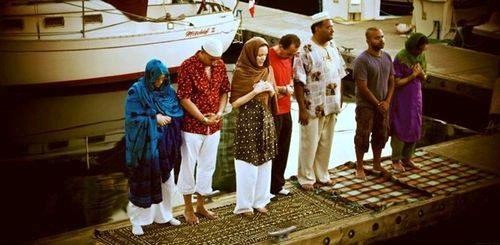Welcome to the pop-up mosque. The one where prayer is often led by women. And where vegan food is served at special events.
Just like any other mosque this Ramadan, the Inclusive Mosque Initiative (IMI) will gather its congregation for Friday prayers, sermons, Islamic recitations and some organised Iftars. But unlike the others, two things will stand out. One is that their venue is not permanent but rather a ‘pop-up’ dependent on donations; and, second, if you do attend, be prepared for a little shock as they do things differently from the traditional sense and you might not understand what they are getting at.
The IMI is a small but slowly growing group of like-minded liberal Muslims whose aim is to create a new type of Islamic community, where the strict religious rules don’t apply; and, where the practice – rather than the theory – of anyone being able to attend their prayers, sermons, recitations and discussions feeling free of orthodox expectations can be realised.
For the IMI, it doesn’t matter from which religious or non-religious sect you belong, you are welcome in this mosque. You might even be invited to their readings of poetry, art exhibitions or picnics and BBQs that offer vegan, vegetarian and gluten-free options! The only rule is that participants and attendees are respectful of each other, not abusive nor violent in active or passive ways.
As they have not been able yet to raise enough money for a fixed carbon-neutral building – as they would like it to be! – they have so far functioned ad hoc and managed to meet in venues across London, Oxford, Manchester and Bristol; in a range of places like community and arts centres, restaurants, outdoor spaces, the Muslim Institute and even holding an inter-faith concert in a church in Waterloo and prayers in a Buddhist Centre.
But great controversy also surrounds their choices and behaviour. For example, prayers and sermons are often led by women and there is no compulsion to even take part or cover the head with a hijab. Women and men stand mixed together in prayer lines and sometimes their Friday discussions might seem a little too philosophical. Some of the past topics included ‘Hijab and Mosques’, ‘Mental Health and Jinn Possession’ or ‘Jokes! Humour in the Hadiths.’
In their defence, the IMI explained: “Part of our understanding of inclusivity in Islam is the theme of non-compulsion in religion. During prayers, not everybody wants to participate or in the same way. We feel that this inter-community aspect is particularly important as differences among sects are too often used to justify violence around the world. Additionally, we have had a number of ex-Muslims and non-religious people attend who in some cases haven’t prayed in years. With our non-compulsion principle, they have returned to their faith and begun to re-engage with Islam.”
Set up two years ago by two women, the first goal was to create a space where women can feel more at ease than they do in central mosques; but, later on, they developed the idea and opened their doors to anyone from any diverse Islamic background or minority who might feel awkward or not well catered to in the usual sense.
Co-Founder Tamsila Tuaqir said:”In our two holiest of mosques in the Muslim world at the Kaaba in Mecca and the Al-Aqsa in Jerusalem, there is no physical division between men and women and women do not stand behind men but side-by-side. We aim to emulate this highest example. There is established tradition of this from the time of the Prophet Mohammed and plenty of scholarship that discusses the permissibility of this, for example, Abdul An-Naim.”
The overall remit of the IMI also connects them with other groups, like Islamic social justice movements, as they tackle other modern issues, like the environment, arts, mental health and the liberation of Palestine.
IMI members come from many backgrounds, including: Sunni, Shia, Sufi, Quranist, Salafi, Braelvi, Islamic Feminist, Secular, Conservative and Reverts. Whilst their ethnic composition reflects British diversity with: Arab, Malaysian, Central European, South Asian, East African and Persian. The community is now international with contact groups in Malaysia, Kashmir and Switzerland.
With the world now so much closer and easily connected, the IMII’s next ambition is of the digital kind. Already, they hold Skype-Koranic discussion circles and reading groups led by a Sheik that have proved friendly, popular and accessible by engaging more people across time-zones.
The IMI said: “Dependent on the technology available and costs, we are developing the theory and investigating the practicalities of a virtual-interactive space where people can enter the mosque from any location from anywhere around the world and take part in prayers, sermons and discussions. We’re talking about more than just a video call but a 4-Dimensional physical experience that includes audio, visual and also eventually olfactory.”
The IMI is very serious about accessibility and they adapt any location for wheelchair users, as well as conducting the call to prayer in British Sign Language. They are presently developing their mission statement into a picture document for people whose first language is not English or those with learning difficulties to be able to understand their ethos.
The IMI is a voluntary organisation entirely dependent on donations and the work of its volunteers. They are currently recruiting for a volunteer fundraiser, accountant and graphic designer to work a few hours a week.
For more information: www.inclusivemosqueinitiative.org.
Note: This article was first published circa July 2014


